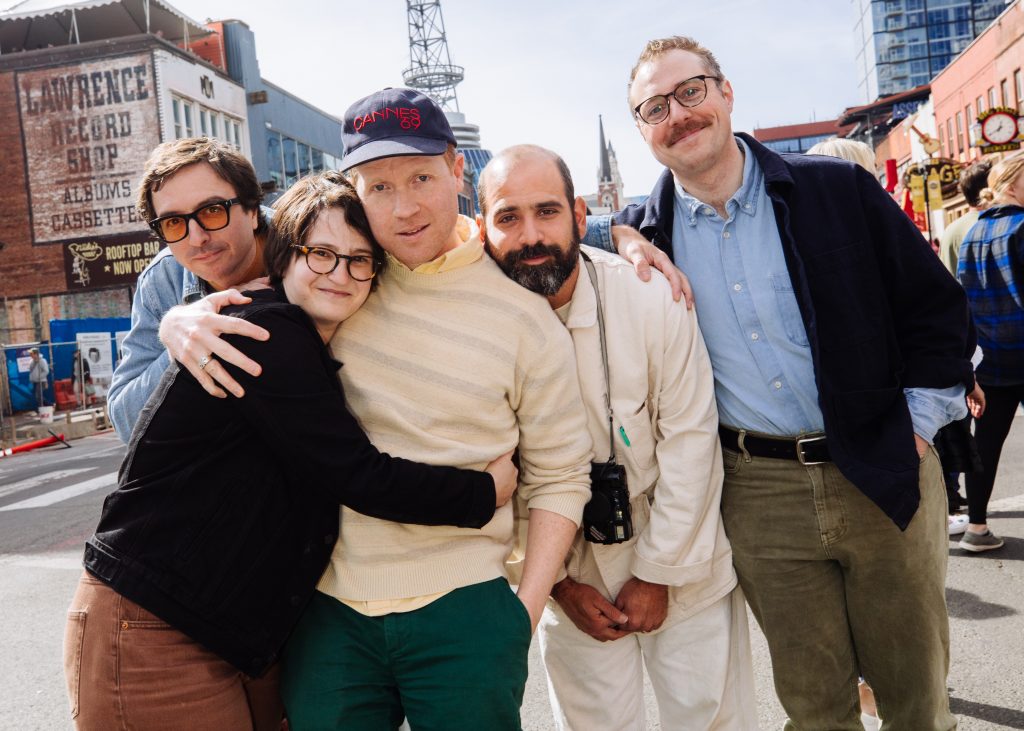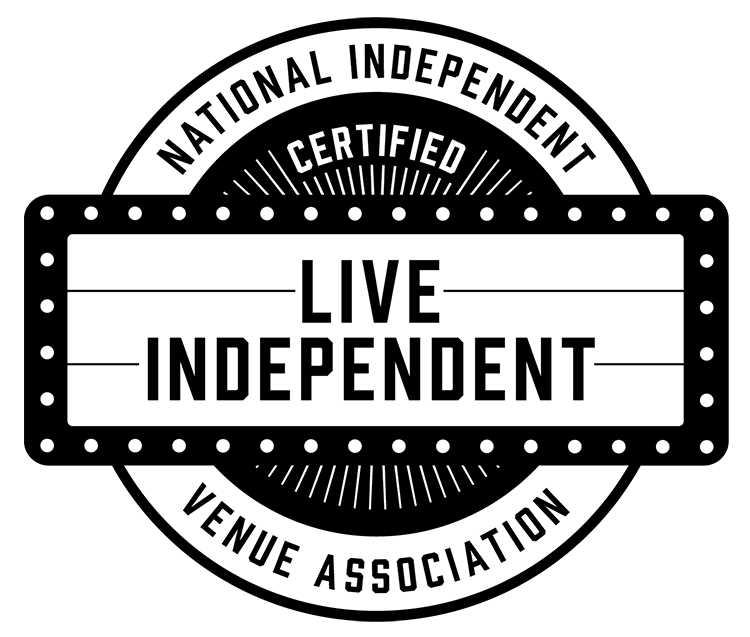Tennis
Thursday, August 28th, 2025



Face Down In The Garden, Tennis’ seventh album, is both culmination and reflection of their career. From the perspective of fifteen years on the road and ten thousand miles at sea, frontwoman Alaina Moore attempts to distill the arc of a life into vignettes: a first moment of connection, a conversation at a wedding, a night offshore, a sprawling tour diary.
The album is succinct but potent, highlighting Tennis’ concise songwriting and unconventional arrangements. Self-produced and recorded in their studio, Tennis builds upon their early minimalist girl-group sound, expanding into more mature synth-pop and rock elements.
The duo met in the University of Colorado’s philosophy department in 2008, when Patrick Riley recognized Moore as the waitress from a diner he frequented. (This moment was later immortalized in their song Hotel Valet.) After graduating, they spent eight months living aboard a small sailboat, voyaging along the eastern seaboard–a practice that would become integral to their creative process. Their debut album Cape Dory (2011, Fat Possum) documents that experience. Tennis booked their first tour through the help of a robust DIY scene. While on the road, their lead single “Marathon” went viral, gaining them sudden notoriety. Cape Dory debuted at #1 on Billboard’s Heatseeker chart and transitioned Tennis from house shows to main stages in the course of a year.
Tennis recorded their sophomore effort Young & Old (2012) with Patrick Carney of the Black Keys, marking their first collaboration with an outside producer and their television debuts on The Tonight Show, The Late Show, and Late Night with Conan O’Brien.
In 2013, Tennis spent sixteen days recording with Richard Swift in his home studio in Cottage Grove, Oregon. Moore and Riley were heavily influenced by Swift’s distinctive approach to engineering. This prompted the duo to build their own studio and take over production and engineering roles on future releases.
Moore and Riley solidified their creative autonomy by forming the label Mutually Detrimental in 2016. Yours Conditionally, their first self-release, became their most commercially successful album, charting on Billboard’s top 50 vinyl sales and proving their DIY roots as a cornerstone to their sound and narrative.
Swimmer (2020, Mutually Detrimental) marked a sonic evolution. Moore and Riley expanded their palette with unique time signatures and arrangements, stepping fully into their roles as songwriters and producer-engineers. But with nearly every show sold out, Swimmer’s momentum was cut short by the Covid-19 pandemic. The duo spent the time at home exploring their role as producers by making records for other artists.
Tennis has continued to thrive by operating on the fringes of the music industry. They’ve survived the flash-in-the-pan fate of so many bands from the early ‘00’s blog-era. Their sixth album, Pollen, saw them grow into the biggest tour of their career, with sold out shows at historic venues like The Beacon Theatre and The Palladium.
Face Down In The Garden is Tennis’ most fully realized work. Crafted entirely by their own hands and guided by their fierce independence, it stands as testament to a band unwavering from their original vision. Tennis embarks on the first leg of their North American Tour in May.

Real Estate
A band for 15 years now, with a half-dozen records to its canny name, Real Estate knows how
the press cycle inevitably goes: Someone somewhere at last had a realization about what their
songs needed to say and how they should sound, so (at least according to brief biographies like
this one) they finally made the best album of their career. But here’s the thing: Real Estate has
been so consistently compelling for those 15 years, with their coruscant indie rock shuffles
perfectly reflecting the spellbinding glow of suburban ennui, that they know when they have
done it. That is, they know when they have written songs that shimmer and fetch and radiate
despite or because of the gloom lurking in their grooves. It is the gift and curse of self-
awareness, of sticking together since childhood.
So Real Estate, in turn, needs you to know that Daniel—their sixth full-length album, recorded in
an ebullient nine-day spree in RCA Studio A, in Nashville with celebrated producer and
songwriter Daniel Tashian—is quite possibly their best album. In 11 compulsively tuneful songs,
they connect the uninhibited wonder of their earliest work with the earned perspective of
adulthood. What more could you need from Real Estate at 15?
Martin Courtney knew he wanted to write a pop record, a set of instantly accessible songs where
the chorus arrived in, say, the first 40 seconds. During the last decade, or essentially since
making Atlas, Real Estate did what was only natural for any beloved and freshly aging indie rock
institution: They gently pushed back against praise as an effortlessly melodic and quietly radiant
band. Colors darkened. Textures curdled. Songs stretched toward the six- and even seven-minute
mark. But what if, as Courtney and cofounder Alex Bleeker often say these days, they again just
“Let Real Estate be Real Estate,” to shimmer and fetch and radiate without hesitation or second
guesses?
Courtney actually learned of Tashian through his daughter, who adored an album he’d produced,
Kacey Musgraves’ Golden Hour. The band reached out and spotted an instant connection despite
their distinct wheelhouses—the Grammy-winning Nashville country-pop guy who’d helmed
several smashes and the Northeast indie rock quintet with narcotic guitars. Real Estate had never
really worked with anyone who wasn’t already a bud. There in Dave Cobb’s famous Nashville
lair, Tashian was not shy with his outsider advice about how to boost this song or that one, even
playfully throwing the occasional candy bar to emphasize he wanted to hear more. Real Estate
had been thinking about R.E.M.’s Automatic for the People and ’90s “soft-rock radio,” the
background music of their youth. Tashian helped lead them back toward it, toward an improved
edition of the less self-conscious band they’d been at the start.
Daniel certainly sounds like classic Real Estate, simply leveled up with the subtle but unabashed
touches of a producer who has actually lived inside pop powerhouses. The chiming guitars and
plaintive verses of “Haunted World” summon the band that first emerged to acclaim in 2009,
with Courtney doing his best to sing his way around existential confusion. But in the chorus,
dexterous instrumental harmonies (that’s Nashville ace Justin Schipper on pedal steel) and faint
backing vocals propel the song anew, its tight hook snagging in a second. Tashian suggested they
fortify the refrain, and he was right.
Or there’s the marvelous thrum of “Airdrop,” with Bleeker’s busy bass and Sammi Niss’ insistent
drums pushing Courtney into the wistful chorus as if he’s riding a hang glider. “The sun went
down/We let it,” he sings four times to end the song, the lines essentially built to be cooed back
at him from a crowd. “Never been so contented/I won’t ever forget it.” That’s Real Estate’s long-
relatable smiling sadness, lifted in proper Music City style. Listen, too, for Real Estate’s
squiggly versions of classic Nashville licks during “Flowers,” where the mercury of pedal
steel and the twinkle of a Wurlitzer illuminate acoustic strums like stars in the night sky. A
song of dislocation and constancy, it’s a reminder of the common way we use music no
matter the genre or scene—to find our way forward.
Daniel is a complete string of these compulsive moments: the crisscrossed harmonies of “Water
Underground,” the delightful sway and rise of “Market Street,” the enchanting but deceptive
simplicity of “Interior.” Real Estate manages the rarest of pop tricks here—to sound effortless
but be artful, with all the flourishes and tricks tucked so smartly into songs that you only spot
them when you unpack what makes all the tunes so winning and sticky.
But this, of course, is not the Real Estate of their MP3-blog salad days. Four members are
married, with Niss in a long-term relationship. There are actual kids in the equation now. And the
world outside has darkened considerably in 15 years, in all those ways that require no recounting
here. Time and again, Daniel wrestles with that juxtaposition—external alienation and madness,
internal responsibility and hope. These are songs of confusion, of trying to find a way to be
present and better in broken times. “Now and then, I can pretend the sun is shining,” Courtney
admits during “Freeze Brain,” the keys of Matthew Kallman and guitars of Julian Lynch framing
a lambent haze around him. “Let’s let some light in.” Ain’t that the struggle, to find some joy
despite all the forces that filch it from us?
In Nashville, all five members of Real Estate shared a rental, cutting up in close quarters after the
imposition of separation of these last few years. Several days into recording, they were
discussing album titles when someone suggested “Daniel,” simply because it seemed funny to
bestow a human name upon a record. Was it for Daniel Tashian? Maybe. Was it a nod to The
Replacements’ Tim? Possibly. Was it the sign of a band that has now been around long enough to
take its music seriously without taking itself or its perception too seriously? Absolutely.
Daniel is a record of wonderful pop songs, its string of hooks and stream of worry irresistibly
connected in the way few bands have ever done better than Real Estate. But perhaps just as
important, it is an expression of the self-acceptance that can come with maturity, with realizing
it’s enough to be who you want to be. “What is it that you want to hear? There’s only so much
time,” Courtney croons during “You Are Here,” Daniel’s ingenious and strutting finale. “Best we
can do is be happy here/Sing another line.” It is a mission statement for Real Estate at 15, a
reminder that they are the band of their childhood dreams and that is cool. To that end, they’ve
never been better at being Real Estate than they are right now, on Daniel, their new best album
yet.







